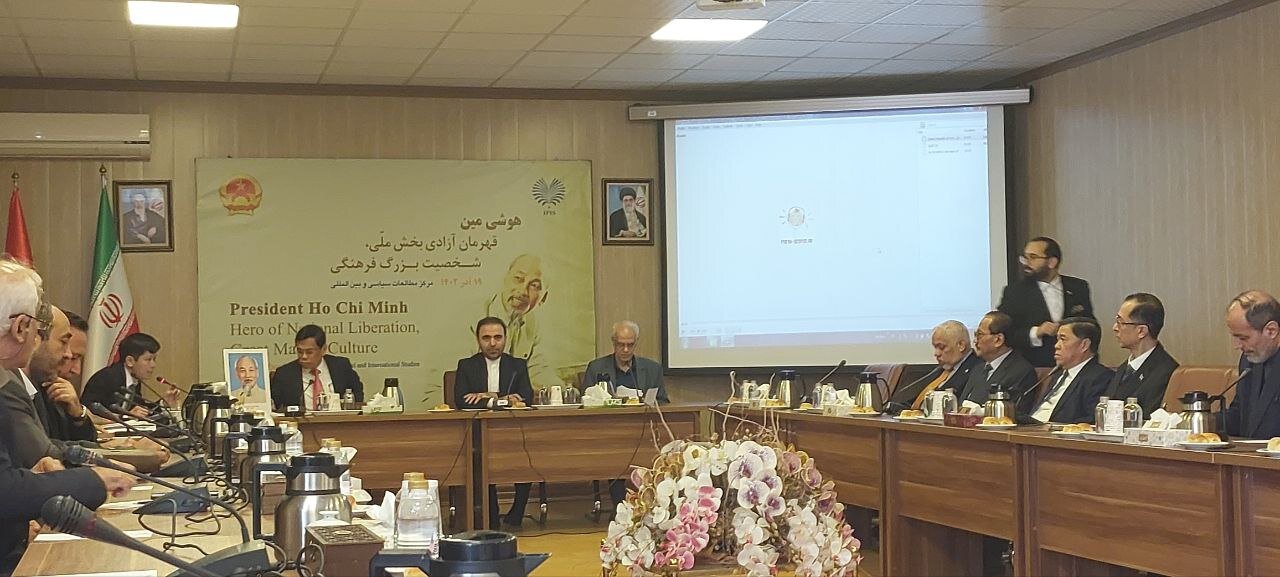Tehran conference explores life and career of Vietnam's esteemed cultural figure

TEHRAN - The Institute for Political and International Studies in Tehran played host to a session on Sunday, delving into the life and career of Ho Chi Minh, the esteemed President of Vietnam.
The session, entitled "President Ho Chi Minh - Hero of National Liberation, Great Man of Culture," attracted the attendance of Ambassador Luong Quoc Huy, representative of Vietnam to Iran, as well as Kamal Sajjadi, former Iranian Ambassador to Vietnam, Vice President of the institute Khalil Shirgholami, and a host of Vietnamese and Iranian diplomats.
The session, held in collaboration with the Embassy of the Socialist Republic of Vietnam, aimed to introduce and commemorate this notable figure of Vietnamese history.
Speaking at the session, the Vietnamese ambassador expressed high regard for Ho Chi Minh's contributions as a cultural figure.
"He is not only revered as a national hero and an inspiration to oppressed nations in their struggle against both old and new colonialism, but he is also highly regarded as a great cultural figure,” he said.
“His enduring works have consistently focused on supporting, preserving, and promoting traditional culture, while attaching great importance to embracing differences, fostering diversity, and advancing knowledge and solidarity," he stated.
For his part, Shirgholami, referred to President Ho as a heritage of global significance, surpassing national boundaries.
Moreover, a photo exhibition showcasing pivotal moments from President Ho's life and career was inaugurated on the sidelines of the event.
Ho Chi Minh, born as Nguyen Sinh Cung in 1890 in Vietnam, led an extraordinary life and had a remarkable career as a revolutionary leader and politician. From a young age, he saw the injustices and exploitation suffered by the Vietnamese people under French colonial rule, which propelled him towards a life dedicated to their liberation.
Ho Chi Minh spent several years abroad, particularly in France and the Soviet Union, where he honed his political ideologies and revolutionary tactics. It was during this time that he adopted the name Ho Chi Minh, meaning "Bringer of Light." He became a founding member of the French Communist Party and heavily influenced by Marxist-Leninist thought, which guided his vision for an independent Vietnam.
Returning to Vietnam in 1941, Ho Chi Minh established the Viet Minh, a nationalist and communist organization fighting for independence from French colonial rule. Through a combination of guerilla warfare tactics and political maneuvering, Ho Chi Minh successfully led the Vietnamese people in their struggle against both French and later American intervention. His leadership and determination culminated in the eventual reunification of Vietnam in 1975.
Throughout his life and career, Ho Chi Minh consistently fought for the rights and freedoms of the Vietnamese people. He was not only a national hero but also an influential figure on the world stage, inspiring other movements and leaders in their fight against colonialism and imperialism. Ho Chi Minh's legacy continues to be celebrated in Vietnam and he remains a symbol of resilience, courage, and commitment to the ideals of independence and social justice.
SAB/
